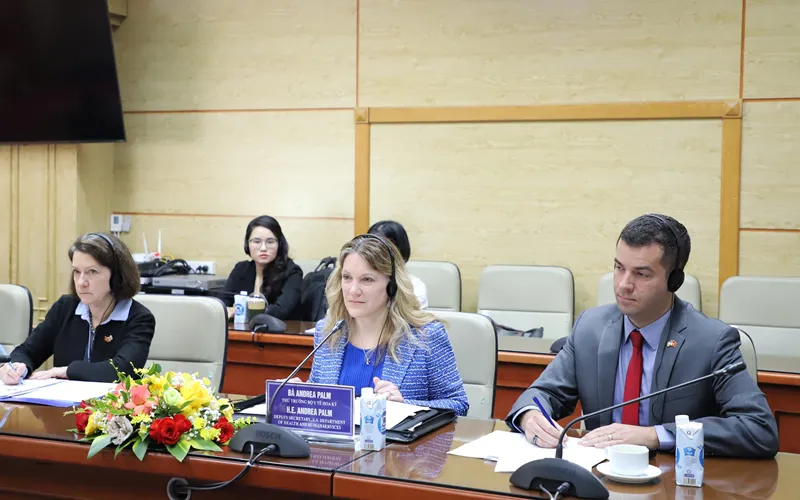Vietnam – Important health partner of the US: HHS
The cooperation includes strengthening laboratory and surveillance systems, preventing zoonotic and vaccine-preventable diseases in the community, supporting workforce development, and outbreak response.
Vietnam is an important health partner of the US bilaterally and multilaterally, Deputy Secretary of the US Department of Health and Human Services (HHS) Andrea Palm said during her visit to the Southeast Asian country this week.
| Vietnamese Deputy Minister of Health Tran Van Thuan and Deputy Secretary of the US Department of Health and Human Services (HHS) Andrea Palm in Hanoi on Oct 30. Photo: MOH |
She said the US reaffirms the importance of US-Vietnam health cooperation and expresses the US desire to acknowledge Vietnam as an important health partner multilaterally through ASEAN.
“I’m grateful for this opportunity to visit Vietnam to see first-hand the strength of the health partnership between the United States and Vietnam and discuss Vietnam’s role as a leader in advancing regional health security,” Palm said.
During the visit to Vietnam, Andrea Palm met with the US Centers for Disease Control and Prevention (CDC) Vietnam and CDC Southeast Asia Regional Office staff, US Embassy officials, and partners from the Government of Vietnam to highlight the importance of the US-Vietnam health partnership.
| Deputy Secretary of the US Department of Health and Human Services (HHS) Andrea Palm and US CDC Vietnam Country Director Eric Dziuban at the meeting with Vietnamese health officials. Photo: MOH |
Decades-long cooperation
In 2023, US CDC will mark 25 years of bilateral health cooperation.
HHS has robust health collaboration with Vietnam both bilaterally and multilaterally through the Association of Southeast Asian Nations (ASEAN), Asia-Pacific Economic Cooperation (APEC), and Global Health Security Agenda (GHSA).
Since normalization of relations in 1995, the US government has contributed over US$1.15 billion to bilateral health programs in Vietnam. The US Centers for Disease Control and Prevention (CDC), an agency of HHS, established a country office in Vietnam in 1998 to implement high-quality, sustainable health systems that lead to long-term impact for the country. In 2021, US Vice President Kamala Harris launched the US CDC Southeast Asia Regional Office in Hanoi to advance regional global health security.
US CDC in Vietnam is the primary partnering agency for Vietnam’s Ministry of Health (MOH), providing technical expertise to support and scale up programs targeting priority diseases including HIV, tuberculosis, and influenza.
In addition, US CDC in Vietnam partners closely with MOH to strengthen laboratory and surveillance systems, develop and utilize emergency operations centers, prevent antimicrobial resistance and infections in healthcare settings, and prevent zoonotic and vaccine-preventable diseases in the community. It also supports workforce development for the 21st century, and particularly recently, supports outbreak response.
Regarding multilateral cooperation, the Southeast Asia Regional Office strengthens the US CDC’s ability to meet its mission of protecting people in America and throughout Southeast Asia by responding more rapidly to health threats wherever they occur and building key relationships to address shared health priorities.
Coordinating with country offices in the region, the Southeast Asia Regional Office is focused on building core public health capacities and responding to public health threats with ministry counterparts and regional partners.
In Vietnam, HHS supports further public health strengthening in the country through the agencies of the National Institutes of Health (NIH) and Biomedical Advanced Research and Development Authority (BARDA), including extramural research collaboration with institutions in Vietnam, focused on HIV, tuberculosis, and other bacterial, fungal, and viral infections, and development of a locally manufactured influenza vaccine, respectively.
“We know that our health is integrally related to that of the health of others around the world. The United States is proud of our longstanding partnership with the Government of Vietnam, which serves as a model of bilateral cooperation in addressing shared health priorities,” said Deputy Secretary Palm.
Meanwhile, US CDC Vietnam Country Director Eric Dziuban said health diplomacy remains a cornerstone of the two bilateral relationship. He said the relations in the health sector dated back to 1950s with US military trainees and civilians coming to fight against malaria in Hanoi. In July 1950, a CDC team of experts in malaria control traveled from Atlanta to Hanoi to share information and experiences with their Vietnamese counterparts. The partners visited Ha Dong, Phung Khoang, Van Phuc, Thach Bich, Hai Duong, Van Quan, Ha Tri, and Phuong Tri and worked together to establish a regional malaria control program consisting of experts in epidemiology, mosquito surveys, and mosquito control. Vietnamese and American partners trained provincial and local staff, who then went on to train additional staff, using a system now known as “cascade training.” This technical collaboration—less than five years after the Declaration of Independence of Vietnam and just one year after the establishment of the CDC—is, “to our knowledge, the earliest contribution to what we now call “health diplomacy” between our two nations,” Eric Dziuban told The Hanoi Times. Just three years after the establishment of diplomatic relations between our two countries in 1995, health diplomacy became a way forward for cooperation and collaboration. CDC, now the Centers for Disease Control and Prevention, established an office in Hanoi in 1998 and another in Ho Chi Minh City in 2005. |













